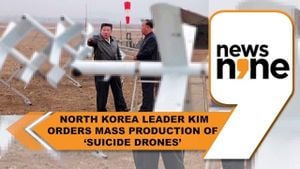Taiwan’s defense strategy is under renewed scrutiny as calls for increased defense spending draw attention to the island’s fiscal challenges and its complex relationship with the United States amid rising tensions with China. Simultaneously, Taiwan President Lai Ching-te's anticipated visits to U.S. military hubs may bolster ties but also provoke Beijing's ire.
Recently, former U.S. President Donald Trump has championed the idea of Taiwan significantly boosting its defense budget to 5 or even 10 percent of its Gross Domestic Product (GDP). This suggestion is gaining traction among some U.S. policymakers and defense experts, who argue it is necessary to counter China's increasingly aggressive posture. Prominent figures like Trump’s former national security advisor Robert O'Brien have echoed these sentiments, advocating for higher defense allocations. Such proposals tilt toward oversimplification, ignoring the multifaceted fiscal and strategic challenges Taiwan faces.
Despite these popular suggestions, Taiwan currently allocates about 2.45 percent of its GDP to defense, approved for 2025 at NT$647 billion (about US$20.24 billion). This level of spending contrasts starkly with the more than half of NATO countries not meeting the recommended baseline of at least 2 percent, putting Taiwan's defense budget allocation squarely within acceptable parameters by international standards. Critics argue, nonetheless, this budget is insufficient, as Taiwan faces heightened military threats from China, which asserts claims over Taiwan as its territory.
The issue of fiscal constraints is significant, as Taiwan’s total government expenditure only accounts for 13.70 percent of its GDP, markedly lower than the OECD average, which hovers close to 50 percent. Fiscal limitations also hinder Taiwan’s ability to expand its defense spending without making tough trade-offs. Spending more on military capabilities means less investment in areas like education, welfare, and public infrastructure—critical components of societal stability.
Political resistance to increasing taxes compounds these financial burdens. Attempts to raise taxes have been met with fierce resistance from both major political parties, who fear voter backlash. Without addressing these structural fiscal issues, the call for dramatic increases to the defense budget may backfire, risking public support and deepening political polarization.
Still, alternatives exist. Experts propose fiscal reform measures, including progressive tax policies and leveraging revenue from Taiwan’s strong tech sector, to sustainably fund defense without sacrificing public services. Increased contributions from high-growth industries could allow Taiwan to secure long-term defense goals.
Meanwhile, Taiwan's security strategy must adapt to China's shifting military tactics. The People's Liberation Army (PLA) has transitioned toward air assault and special operations capabilities, necessitating rapid adjustments to Taiwan's defense priorities. Should direct conflict arise, Taiwan may find itself compelled to engage unauthorized urban defense strategies much earlier than anticipated.
Adding to the geopolitical complexity, President Lai is scheduled to visit Hawaii and possibly Guam, both strategic for U.S. military operations aimed at countering China's influence. While the precise details of his itinerary remain under wraps, Lai's trip is expected to serve as both symbolic support for Taiwan's Pacific allies and strengthen U.S.-Taiwan relations.
Beijing has swiftly condemned Lai's upcoming visit, framing it as provocative. Chinese officials have insisted Taiwan must abide by the one-China principle and avoid international engagements viewed as legitimacy for Taiwanese sovereignty. Notably, past military drills launched by China were punitive responses to Taiwanese engagement with U.S. officials.
Further complicamirng matters, the United States by the spirit of its defense commitments, continues to supply Taiwan with arms. Despite not formally recognizing Taiwan as independent, the U.S. remains its primary weapons supplier, contributing to Taiwan's self-defense capabilities, including plans for advanced systems like F-35 jets and other state-of-the-art technology.
Recently, Trump’s comments about Taiwanese defense spending indicate he sees this moment as pivotal, expressing concerns over Taiwan’s significant role within the semiconductor manufacturing sector and its perceived balance of power with the U.S. Amid these tensions, Lai has expressed eagerness for defense reforms and deepening U.S.-Taiwan cooperation.
Analysts note these dynamics must be navigated carefully. Calls for increased military funding without foundational changes risk depleting public trust and support for the government. Taiwan's future defense strategy will need more than just budget increases; it requires reassessment of national priorities to meet asymmetric threats from China.
Looking more broadly, as Taiwan faces exigent security threats, how the U.S. and Taiwan navigate these complicated fiscal and military landscapes will have lasting ramifications. Taiwan’s position at this juncture demands not just immediate responses to defense needs but also long-term, sustainable strategies to fortify itself against aggression.



